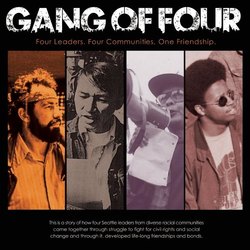Читать книгу The Gang of Four - Bob Santos - Страница 21
На сайте Литреса книга снята с продажи.
Оглавлениеfound jobs as apple pickers but were constantly harassed by young white men who drove by and shouted racial obscenities at them because of the color of their skin. Luana, Lawney, and Pickles, the family’s dog, took care of little Bernie. Julian kept a gun handy when the family slept.
After the apple-picking season was over, the Reyes family once again packed up and drove off in their Model T, back toward Inchelium. On the way back, the family stopped off at a rest stop. Pickles, the family dog, jumped out of the car. A car, with four young white men, purposely ran over Pickles. The family was shocked! They dug a shallow grave, laid their beloved family pet to rest, and drove solemnly on.
Julian Reyes spent long hours, working on a small wood-framed house, building a shed, digging a cellar, which became a storehouse for vegetables and a playground for the three children. But while Julian solidified the foundation for the family home, his marriage to Mary began to crumble and she suddenly left the family in the spring of 1939. Maybe it was the age difference--Julian was forty-five years old, Mary was twenty-six years old.
Little Bernie was left in the care of his older sister Luana. Luana was only six years old and she tried her best. She washed her little brother, combed his hair, fed him breakfast, brushed his teeth, and bathed him. She helped prepare the family meals.
In 1940, after ten years of marriage, Mary filed for divorce from Julian. Bernie, at the age of two years old, was too young to understand what was happening.
Judge Brown granted Mary a divorce but made a ruling on custody that made nobody happy. He determined that neither parent could properly afford to care for the three children. Although the judge gave custody of the children to Julian, Luana and Lawney were ordered to attend an off-reservation boarding school.
Young Bernie was sent to live with Mary’s foster parents, Charlie and Eliza Hall. Julian would have custody over Bernie on the weekends when he wasn’t working. Mary did get visitation rights. She wasn’t happy by the decision but didn’t have the money to appeal the custody order.
As the fall of 1940 approached, Lawney and Luana learned that Judge Brown had sent them to attend the Chemawa Indian School near Salem, Oregon. Now, young Bernie had to not only adjust to life without his mother but also had to adjust to life without his siblings.
Life wasn’t so good for young Bernie. During the weekdays, he lived with the Halls. His father was constantly gone, in search of odd jobs here and there. No children lived near them so Bernie had no playmates. He greatly missed his mother, sister, and brother. He did have Brownie, the family dog, for company. Because his son was so lonely, Julian bought a goat to keep Bernie company. Bernie named the goat, “Goat!”
The Halls were elderly and in frail health. Like many families in Inchelium, the Halls were poor. Bernie wore pants with patches covering holes, ragged shirts, and well-worn shoes.
The salmon, which had been a major staple, had stopped running when the Columbia River was dammed. Bernie never had fresh milk and often went without eating. Fresh vegetables were only available during the summer. Friends often helped out, giving Julian beans, cornmeal, and macaroni to help feed his son.
In early 1941, Julian secured a loan from the tribe and with the help of friends, built a new house. He built a two-room house near a running creek, but it had no running water or electricity.
When the summer came, Lawney and Luana finally came home. Bernie spent the entire summer, tagging along after Lawney or having Luana read to him. His playgrounds were the forests, creeks, and rivers where his father worked. He learned about fishing and hunting from his brother and about nature from his sister.
Such was young Bernie’s early life.
11
